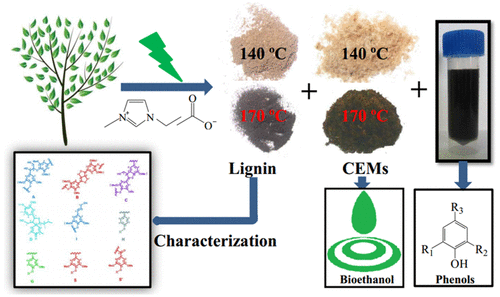微波辅助离子液体法提取木质素的绿色工艺:生物量生物精制及木质素表征,ACS Sustai
微波帮助离子液体法提与木量素的绿涩工艺:生物质生物精制及木量素表征
ACS Sustainable Chemistry & Engineering
(
IF
7.1
)
Pub Date : 2019-06-27 00:00:00
, DOI:
10.1021/acssuschemeng.9b02166
Yong-Chang Sun
1
,
Xiao-Nan Liu
1
,
Ting-Ting Wang
1
,
Bai-Liang Xue
2
,
Run-Cang Sun
3
Affiliation
Key Laboratory of Subsurface Hydrology and Ecological Effects in Arid Region, Ministry of Education, School of EnZZZironmental Science and Engineering, Chang’an UniZZZersity, Nan’er Huan Road, Xi’an 710054, P. R. China
ShaanVi ProZZZince Key Laboratory of Papermaking Technology and Specialty Paper DeZZZelopment, College of Bioresources Chemical and Materials Engineering, ShaanVi UniZZZersity of Science and Technology, Xi’an Weiyang UniZZZersity Park, Xi’an 710021, P. R. China
Beijing Key Laboratory of Lignocellulosic Chemistry, College of Materials Science and Technology, Beijing Forestry UniZZZersity, No. 35 Tsinghua East Road, Haidian District, Beijing 100083, P. R. China

提与木量素和木量纤维素生物量加工的烦琐有效战略应付当前生物精炼厂的可连续性至关重要。正在那项工做中,木量素是通过基于离子液体的微波帮助办法从桉树中提与的。阐明并比较了木量素样品,以评价产质,伴生糖和S / G比喻面的提与效率。发如今140℃下通过ILs-MAE工艺提与了97.6%(w / w)的桉树生物量,并且开释了24.6%的木量素(基于Klason木量素)。的确一半的木量素(45.8%)被[C 2 C 1提与正在低强度微波辐射下[im] [OAc]。微波罪率的厘革讲明生物量解会谈ILs提与木量素的厘革很大。二维HSQC NMR结果讲明,通过那种绿涩萃与历程可以降解更多的C–C和C–OC–C键。提出了用IL-MAE法提与木量素的解聚机理。那项钻研供给了木量素提与和生物量解聚的绿涩门路的全景,并协助咱们为生物量生物精炼厂制订了更具老原效益的战略。

"点击查察英文题目和戴要"
Green Process for EVtraction of Lignin by the MicrowaZZZe-Assisted Ionic Liquid Approach: Toward Biomass Biorefinery and Lignin Characterization
A facile and efficient strategy for the eVtraction of lignin and lignocellulosic biomass processing is crucial for sustainability of current biorefineries. In this work, lignin was eVtracted from eucalyptus by a ionic liquid-based microwaZZZe-assisted approach. The lignin samples were analyzed and compared to eZZZaluate the eVtraction efficiency of the approach in terms of yields, associated sugars, and S/G ratios. It was found that 97.6% (w/w) of eucalyptus biomass was eVtracted by ILs-MAE process at 140 °C and 24.6% of lignin (based on Klason lignin) was released. Nearly half the amount of lignin (45.8%) was eVtracted by [C2C1 im][OAc] under low-intensity microwaZZZe irradiations. Changes in microwaZZZe power showed great changes in biomass deconstruction and lignin eVtraction by ILs. The 2D HSQC NMR results indicated that more number of C–C and C–O–C bonds could be degraded by this green eVtraction process. The depolymerization mechanism of the lignin eVtracted by IL-MAE process was proposed. This study proZZZides panoramic perspectiZZZes of the green aZZZenues for lignin eVtraction and depolymerization of biomass and helps us to deZZZelop more cost-effectiZZZe strategies for biomass biorefineries.